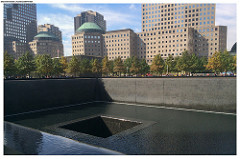By JAMES BYRNE
for Yusef Komunyakaa
Downtown, already snagged between two countries, I make stock footage for an English return—block after block, hobbling in unwalkable shoes, uptown from the Ground Zero memorial where, today, Obama laid wreaths and tousled the head of Cannizzaro: a one-year-old boy on 9/11. “You look just like your father,” said the President, “sorry he’s gone.” Death stalks the day like a dog, whistles from news-racks, Time spreads Osama with a red-drip cross on his head: “Special Report: The End of Bin Laden.” Later, in Lillian’s House, at the reading on West 10th, I peel back strips of plaster: no comfort these 2-Pod Xtra Comfort leathers. In the poem from “Warhorses” a soldier suicides on a grenade and is blown to the limbs. “He just dove on the damn thing, Sir.” Of the surviving battalion one tries to jigsaw the confetti of the dead man’s stomach, another stuffs pieces of him into a rag bag. Death stalks the day like a dog. In my cheap shoes I shuffle for a pipe on Patchin Place with the student we nickname “The Green Godmother.” Her brother will be reposted from Korea back to Texas next week. She feels bound to Korea—the returning nerve to retrack a mother who gave her up for adoption. “I don’t know where to live anymore,” she says, but her Sea Legs thesis is signed away, to which we cheer. But quickly, wave after wave hits and the wandpipe blurs me off into Sixth Avenue—a hornet row of taxis, my face pained in the tourist bus window, a mere grimace against the hierarchy of pain. “For those who can walk away, what is their burden?”
James Byrne’s most recent poetry collection Blood/Sugar, was published by Arc in 2009. He is the editor of The Wolf, an internationally-renowned poetry magazine, which he co-founded in 2002.
[Click here to purchase your copy of Issue 08]




